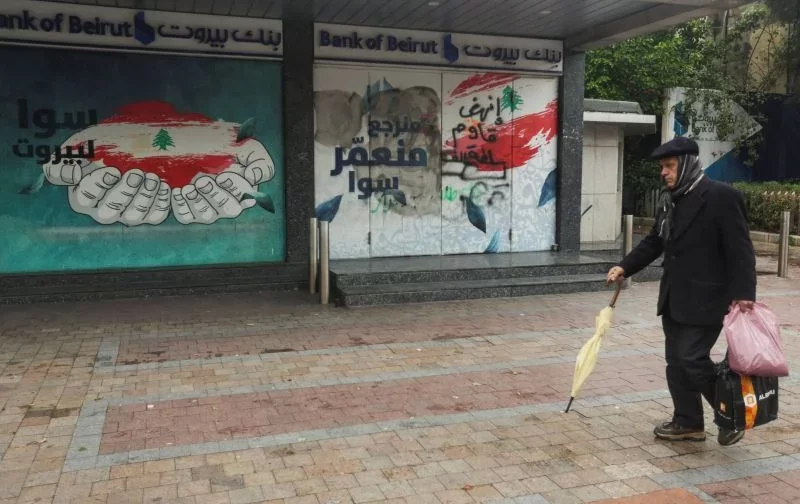
A passerby in front of a closed branch of the Bank of Beirut in Saida, South Lebanon, on Feb. 7, 2023. Commercial banks are expected to open until the end of this week, suspending their open-ended strike. (Credit: Aziz Taher/Reuters)
Want to get the Morning Brief by email? Click here to sign up.
Lebanon’s caretaker cabinet is scheduled to meet today to discuss public employees’ salaries, medicine imports and earthquake-related damage to infrastructure. The meeting’s agenda includes discussing a loan to state-owned telecoms operator Ogero to fund staff salaries after a brief strike by employees demanding unpaid dues; increasing military and General Security personnel’s transportation allowances amid spiking fuel costs; as well as ensuring public employees’ salaries in the absence of a budget for 2023 by releasing funds in line with the provisional twelfth rule — referring to Article 86 of the constitution which allows the state to spend one-twelfth of the budget provided for in the previous year’s finance law. The cabinet is also expected to discuss the exemption of certain medicines from customs taxes — amid reports of pharmaceutical product shortages jeopardizing patients’ treatment. The ministers will also address a High Commission for Relief's request to survey infrastructure damage — following a call by caretaker Interior Minister Bassam Mawlawi for municipalities to report damages after Lebanon experienced reverberations from the devastating Feb. 6 earthquake that killed over 50,000 people in Turkey and Syria. Caretaker government meetings remain controversial amid the presidential vacuum, with a number of ministers having boycotted previous sessions.
Commercial banks are expected to remain open until the end of this week, an Association of Banks in Lebanon (ABL) source told L’Orient Today, suspending an open-ended strike contesting judicial pressure and delays in the passing of a capital control law. The claim follows a Friday meeting between ABL representatives and caretaker Prime Minister Najib Mikati, after which the source said banks would operate as usual this week — coinciding with the time frame of public employees’ salary collection. ABL launched an open-ended strike on Feb. 6 after a court decision allowing the resumption of a lawsuit by depositors demanding their funds in dollars from Fransabank. Legal pressure on banks ramped up the following week when Mount Lebanon Court of Appeals public prosecutor Judge Ghada Aoun leveled charges of money laundering and issued an asset seizure order against Bank Audi, and a week later, Société Générale de Banque au Liban, for not providing select employees’ account information. Mikati on Saturday claimed that his letter to caretaker Interior Minister Bassam Mawlawi alleging that dismissal requests by banks against Aoun disqualified her from continuing her investigation aimed at protecting the banking sector and the economy, “not to protect any banker or bank that violates the laws.” Mawlawi responded by barring security forces from executing Aoun’s orders against banks — resulting in a wave of backlash from judicial circles, including from the Higher Judicial Council and the Lebanese Judges Association.
As of next Monday, “citizens will be able to go directly” to General Security centers for passport requests, the state institution announced in a statement, resolving a travel document request bottleneck resulting in yearlong wait times for appointments. “The new passports will be issued within 25 days,” General Security said. Passport renewal “appointments obtained on the [General Security's electronic] platform will be canceled,” the statement read, adding that the platform will be repurposed to handle emergency requests to scheduled appointments within five days. General Security implemented the online platform to manage a high volume of demands for passport renewals, resulting in yearlong wait times for appointments. General Security head Abbas Ibrahim earlier this year announced an upcoming resolution to the crisis, attributing the delays to payment issues hampering the procurement of blank documents.
Swiss authorities have initiated proceedings against two banks in the “Lebanese context” amid investigations into alleged money laundering by Banque du Liban governor Riad Salameh, according to Sunday Swiss weekly SonntagsZeitung. The Swiss publication did not specify which banks the Swiss Financial Market Supervisory Authority (Finma) targeted, while claiming that embezzled funds had been deposited in 12 Swiss banks — including UBS, Credit Suisse, Julius Baer, EFG and Pictet and $250 million in Salameh’s brother, Raja’s, personal account at a HSBC branch in Geneva. The BDL governor’s brother is the primary financial beneficiary of the Virgin Islands-registered Forry Associates Ltd. — which was allegedly used to siphon hundreds of millions of dollars in commissions from the central bank for services never provided. The Swiss Federal Prosecutor's Office, in an ongoing investigation into Salameh launched in October 2020, has frozen millions of dollars of the BDL chief’s funds. Salameh is being investigated in at least five European countries, while also being the subject of two local cases. Last week, Riad Salameh, his brother Raja and his former assistant Marianne Hoayek were charged with “embezzlement of public funds” and “money laundering.”
Sunni Sheikh Ahmad Rifai’s body was found buried in Akkar yesterday, a week after his disappearance, a spokesman for the Internal Security Forces confirmed to L'Orient Today. The ISF on Friday arrested four suspects, who allegedly kidnapped and killed the cleric over a family dispute. Mufti of the Republic Sheikh Abdel-Latif Derian called on security forces to accelerate the investigation into Rifai’s death, while thanking them for having “quickly identified the criminals, avoided sedition and put an end to the rumors that accompanied this incident.” Akkar residents blocked a road on Wednesday to demand security forces intervene in the search for Rifai, who had been missing since Monday night. Rifai was known for his hostile stance on Hezbollah and the pro-Iranian axis in Lebanon. Press reports claimed that the sheikh’s latest sermon addressed drug trafficking in areas under Hezbollah's influence.
In case you missed it, here’s our must-read article from over the weekend: “Why tsunami fears are unwarranted after recent earthquakes in the region”
Compiled by Abbas Mahfouz
